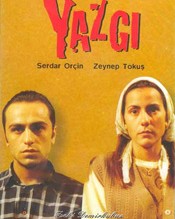
Dark, Existential Films Top Turkish Festival
…One of the main reasons for the upsurge on interest in Turkey’s art cinema is Zeki Demirkubuz, an intense young auteur who created a minor buzz last year when two of his films screened at Cannes. Given his hellish past as a political prisoner, it’s no surprise that Demirkubuz favors silent, dark interiors; harsh existential themes; and shots of his actors gazing emptily through open doorways and windows, as if from chambers of solitude.
Those artistic inclinations are evident in a pair of films, “Fate” (Friday, 7:30 p.m.) and Confession (Itiraf) (Saturday, 1:00 p.m.), that are true standouts in the series. The first two installments of in a trilogy Demirkubuz has dubbed “Tales About Darkness,” both show a director with a stripped-down, almost Beckettian sensibility who continuously explores themes that, to put it kindly, do not promise much in the box-office success, even if they will intrigue many viewers.
In “Fate,” a sly adaptation of Albert Camus’ “The Stranger,” Demirkubuz transforms the anti-hero Meursault into a hollow-eyed, expressionless clerk named Musa, for whom life is an absurdity. After his mother dies suddenly, Musa appears to be unfazed; his routine―drinking coffee, working at the customs office―remains the same. Through sheer indifference (“It doesn’t matter” is his stock response), he becomes involved in a neighbor’s deadly scheme and even agrees to marry his co-worker Sinem, though he cares nothing for her. Later he takes the rap for the murder of his boss’ family, giving Demirkubuz an opportunity to explore questions of fate, freedom, and morality.
Similarly paced and tonally identical is Confession (Itiraf) a haunting drama of emotional anguish that takes up themes of pride, shame, revulsion, infidelity, and male-female power dynamics. Harun suspects that this wife, Nilgun, is having an affair. He waits for her at home, TV blaring senseless news, the rings under his eyes getting heavier. He eaves-drops on her and traces a call to her lover’s bedroom. When he finally confronts her, she admits to wanting a separation, but nothing more. Harun explodes―imploring, threatening, antagonizing her―grinding hope like bits of glass underfoot. What follows is a cycle of betrayal, confession, betrayal that finally ends, without resolution, in a solemn portrait of isolation…
by Damon Smith, Boston Globe, 2003



